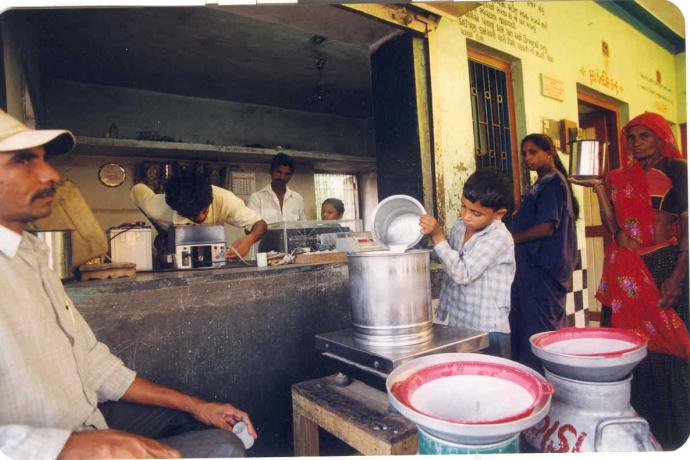Business Call to Action Announces New Initiatives During G20 Inclusive Business Workshop in Mumbai
Companies work to employ India's poor
Published 04-16-13
Submitted by Business Call to Action (BCtA)
 Photo: Courtesy Akashganga/Shree Kamdhenu Electri
Photo: Courtesy Akashganga/Shree Kamdhenu ElectriThree companies have made new commitments to help thousands of low-income people in rural India improve their livelihoods, health and environment through the Business Call to Action (BCtA), an anti-poverty initiative backed by the UN Development Programme (UNDP).
“By thinking differently about how to meet basic needs, companies are realizing the added value of incorporating in the value chain under-served populations who could ultimately become key stakeholders in alleviating poverty,” BCtA Programme Manager, Sahba Sobhani, said.
“Business Call to Action is pleased to once again highlight unique models of inclusive business, especially as the private sector envisions new market-based approaches.”
Three innovative companies— Aravind Eye Care Systems, Waste Capital Partners, Shree Kamdhenu Electronics —are working through the BCtA platform to generate new opportunities by providing key supply and distribution channels in their respective regions of India.
Low-cost Eye Care
Some 30 percent of India’s population needs eye care while 80 percent of vision loss is believed to be preventable.
Aravind Eye Care System, the country’s largest provider of ophthalmological services, has committed to train 750 healthcare workers through a new on-line system with the aim of increasing the number of eye surgeries from 350,000 to 500,000 yearly by 2016 and to 1 million by 2020. In addition to basic eye care and preventative treatment, Aravind, is a leading company in providing cataract, glaucoma and retinal surgeries.
Aravind trains Mid-Level Ophthalmic Professionals (MLOP’s) to make ophthalmologists more productive. The company expects to recruit and train 650 women from rural communities, after which they can be certified as MLOP’s. All of the systems are oriented towards enabling the doctors to reach as many patients and ensure support through a well-trained paramedical staff. In addition, community outreach programs are central to Aravind’s mission, since most of the blind are often living in remote, rural areas. The company’s all-women teams of professionals are a key component of its workforce.
“The training platform offers a way for our company to efficiently scale up training capacity while standardizing the learning process,” the company’s Administrator, Dr. S. Aravind, said. “By providing training opportunities, we will be able to expand our reach and optimize resources.”
Waste Management
In India, rural and urban areas produce significant levels of waste and hazardous materials, with only an estimated 50 percent properly collected in accordance with health and safety standards—leading increasingly to vector-borne illnesses and contaminated ground water.
Waste Capital Partners is piloting a progressive model for waste disposal in emerging-market cities while disseminating the model through its nonprofit social enterprise, Waste Ventures, based in Vizag.
“We are working to empower waste collectors, many of whom are women, and also create a sustainable revenue model for improved waste collection, composting, and recycling,” Waste Capital Partners and Waste Ventures founder, Parag Gupta, said.
As part of its commitment to BCtA, Waste Ventures will employ 10,000 formerly-independent waste pickers as collectors, composters, and recyclers by 2017. The company also plans to offset 200,000 tonnes of carbon dioxide over the next five years. Already, the company has instituted an Employee State Insurance and Provident Fund for its employed waste pickers along with opening up individual bank accounts.
By using a thermophilic composting technique, Waste Capital Partners also eliminates methane – a gas that according to them is 24 times as harmful to the atmosphere as carbon dioxide – and prevents it from forming in rotting waste.
Technology for the Dairy Industry
India has quadrupled milk production over the past 40 years and now leads the world in dairy output. But yield per cow is relatively low in quantity and quality. Shree Kamdhenu Electronics Pvt. Ltd., based in Vallabh Vidhyanagar in central Gujarat state, has designed a milk collection system to improve productivity at the grassroots level, called Akashganga.
Meaning “Milky Way” in Hindi, Akashganga comprises an automated, electronic milk collection system geared toward village dairy cooperatives. It efficiently weighs milk output, indicates fat content, calculates prices payable to suppliers, and provides customer numbers and date-time labeling.
The company aims to raise smallholder income for 600,000 farmers mainly in northwestern Gujarat, parts of Maharashtra and a few other selected states by 2014. It is also working to increase efficiency in the milk collection process and improve the payment system for dairy farmers.
“We believe the new system will increase trust between farmers and cooperatives by generating pay slips in regional languages and devising technology to eliminate bottlenecks in collection, replacing therefore outdated weighing methods,” Akashganga programme director, Ujval Parghi, said.
The company plans to replicate the Akashganga business model in other key farming states in India.
G20 Inclusive Business Workshop in Mumbai
The Governments of Germany and Saudi Arabia as co-facilitators of the G20 Pillar “Private Investment and Job Creation” have extended a special invitation for BCtA members to attend the G20 Inclusive Business Workshop in Mumbai on 16-18 April.
With its theme “Scaling Impact through Innovation”, the G20 Inclusive Business Workshop is a highly exclusive business forum that will bring together the G20 Challenge winners with business leaders and experts to discuss best practices and solutions for accelerating inclusive business models.
The results of the workshop will be fed into the G20 Development Working Group and serve as a basis for future policy recommendations on fostering inclusive business models.
To learn more, contact:
BCtA: Karen Newman, karen.newman@undp.org +1(212) 906-5194
Aravind Eye Care System, Vinoth Palanichamy vinoth@aravind.org +914524356500
Shree Kamdhenu Electronic: Ujval Paraghi, ujval@akashganga.in +919427610355
Waste Capital Partners: Parag Gupta, parag@wastecapitalpartners.com +14156445129
About the Business Call to Action (BCtA):
Business Call to Action is a global initiative that challenges companies to develop inclusive business models that offer the potential for development impact along with commercial success. The initiative is the result of a partnership between the Australian Agency for International Development (AusAID), the Dutch Ministry of Foreign Affairs, the Swedish International Development Cooperation Agency (Sida), UK Department for International Development (DFID), US Agency for International Development (USAID), United Nations Development Programme (UNDP), the United Nations Global Compact, the Clinton Global Initiative, and the International Business Leaders Forum to meet the anti-poverty Millennium Development Goals by 2015. Companies report on progress toward commitments on an annual basis. www.businesscalltoaction.org @bctainitiative
Aravind Eye Care System was founded in 1976, by Dr. G. Venkataswamy, known to most of simply as Dr. V. In an eleven bed hospital manned by 4 medical officers, he saw the potential for what is today, one of the largest facilities in the world for eye care. Over the years, this organization has evolved into a sophisticated system dedicated to compassionate service for sight. The Aravind Eye Care System now serves as a model, for India, and the rest of the world.
Waste Capital Partners
Waste Capital Partners works in close partnership with Waste Ventures, a US-based 501c3 charity founded by Parag Gupta who also founded Waste Capital Partners, which searches for and incubates waste picker co-operatives. Through the partnership, Waste Capital Partners sources potential candidates for investment and carbon development. Beyond providing start-up support, Waste Ventures also continuously provides technical and management support to the Waste Picker co-operatives.
Shree Kamdhenu Electronic
Shree Kamdhenu Electronics Pvt. Ltd. (SKEPL) conceptualized the need for an Automatic Milk Collection System (AMCS) in early 1990 for Ensuring Transparency , Mutual Faith and Error free operations of the Milk Collection by integrating Electronics Weigh Scale with Quality testing equipment ( EMT or Milk Analyzer) & Data Processor/ Computer, we are pioneered in the participating of rural people with modern technology. SKEPL delivers products and services under the brand name of “AKASHGANGA.” AKASHGANGA offers end to end solution for milk collection using state of the art technology.

Business Call to Action (BCtA)
Business Call to Action (BCtA)
Business Call to Action is a global joint advocacy platform that works to accelerate progress towards the Sustainable Development Goals (SDGs) by challenging and supporting companies to develop inclusive business models that offer the potential for both commercial success and development impact. It is hosted by the United Nations Development Programme and funded by Dutch Ministry of Foreign Affairs, Swedish International Development Cooperation Agency (Sida), Swiss Agency for Development and Cooperation, UK Department for International Development (DFID). To date, 230 companies from around the world have signed on to commit to contribute to the SDGs, from large multinational companies to national and small- and medium-enterprises in 70 countries.
More from Business Call to Action (BCtA)

